2007/06/15. There are currently no available spots in ENGL 1200 for Summer 2 2007.
If you are a student in ENGL 1200, you will find updated information in WebCT, which is much more interactive than this web page in its current state.
U of M Department of English Undergraduate Guide to Studying Literature (.pdf)
Punctuation Guide for students Of ENGL 1200 & 1340 (.pdf)
OED (Oxford English Dictionary). Note: You will need your ID and PIN to log in.
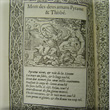 ENGL 1200. Representative Literary Works
ENGL 1200. Representative Literary Works
(*6, Summer 2, 2007) Course Objectives and Content: This course’s overall objective is to provide you with an introduction to the discipline of literary studies in English. On the one hand, it provides an introduction to representative works of prose, poetry, and drama from various historical periods; on the other hand, it provides an introduction to the tools needed to read and write about these texts critically. The course promises to help you learn to recognize literary forms and stylistic devices, understand their importance, and to use critical terms and techniques accurately. It also offers substantial practice in the composition of formal, analytical essays. For more of the description and a preview of the syllabus, please follow the link to the course or click here. PLEASE NOTE THE SYLLABUS IS STILL SUBJECT TO SOME CHANGE.
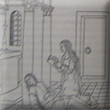 ENGL 1340. Intro. to Literary Analysis
ENGL 1340. Intro. to Literary Analysis
(*3, Fall Term 2007) Course Objectives and Content.
Much like its six credit cousin, English 1200, this course provides an introduction to the discipline of literary studies in English, but it focuses much more intensely on aspects of analysis, the discipline of reading and writing in an English Department. Students will therefore need to become somewhat familiar with prose, poetry, and drama from various historical periods. The course promises to help you learn to recognize literary forms and stylistic devices, understand their importance, and use a range of critical terms accurately. For more of the description and a preview of the syllabus, please follow the link to the course or click here.
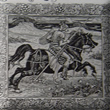 English 3800.
English 3800.
King Arthur and the Matter of Britain
(*3, Fall Term 2007) Course Objectives and Content. Jehan Bodel, a thirteenth-century French poet, classifies Arthurian material in Medieval Romance as the Matter of Britain. But Arthur is not bound to a single genre. Historical texts like Geoffrey of Monmouth’s History of the Kings of Britain, and those of his followers, Wace and Layamon, introduce to Latin, French, and English readers Arthur’s narrative respectively. Letters and legal documents both relied upon and reinforced the historical authenticity of such texts by citing them in their claims of legitimacy. At the same time, other genres, from the lais of Marie de France to Sir Gawain and the Green Knight, give Arthur’s court a different kind of reality, making it come alive in narrative. But perhaps no text reflects and propagates the importance of Arthur’s representation in historical and literary genres as well as Sir Thomas Malory’s Morte Darthur. For more of the description and a preview of the syllabus, please follow the link to the course or click here.
Recent Courses
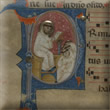 ENGL 2080. Medieval Literature
ENGL 2080. Medieval Literature
(*6) Course Objectives and Content. Covering a period of time that is as long as it is distant to our own, this course challenges us in two related ways. On the one hand, it asks us to engage with texts and authors originating in a context that may seem completely foreign. On the other hand, it asks us to acknowledge the variety of voices and languages that proliferated in England from the Saxon migration until the advent of printing. We will respond to these challenges by examining a diverse selection of Medieval texts and by considering numerous critical approaches that communities of scholars have used to interpret them. The aim of this course is to encourage students to experience the complexity of medieval culture in its homogeneity and heterogeneity, its prejudice and tolerance, its religious fervor and apparent humanism—in other words, in its similarity and difference to our own. For a view of the syllabus, please follow the link to the course or click here.
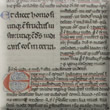 ENGL 3080. Reading and Writing Manuscript Books.
ENGL 3080. Reading and Writing Manuscript Books.
(*3) Course Objectives and Content. A book’s shape and structure determine how we imagine and consume literature. Yet we often ignore historical differences in book production that would have made the experience of writing and reading fundamentally different for the medieval reader. This course examines several key texts in order to ask how the conception of the book altered during the fourteenth and fifteenth centuries. We will discuss what effect this change had on how literary texts could be imagined. This inquiry will lead us to questions about we should conceive of authorship in a manuscript culture. For a view of the syllabus, please follow the link to the course or click here.
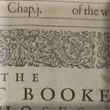 ENGL 7600. Romancing the Tome; Or, Bibliography for Bibliophiles
ENGL 7600. Romancing the Tome; Or, Bibliography for Bibliophiles
(*3) Course Objectives and Content. A. S. Byatt’s Possession: A Romance opens with a passage that can only be classified as bibliographical: “the book was thick and black and covered with dust. Its boards were bowed and creaking; it had been maltreated in its own time. Its spine was missing, or, rather, protruded from amongst the leaves like a bulky marker. It was bandaged about and about with dirty white tape, tied in a neat bow” (1). Although bibliography might not seem particularly romantic, this narrative’s opening lines suggest that a love of books— even a particular book—can lead to other kinds of passion. For more of the description and a view of the syllabus, please follow the link to the course or click here.
My teaching and research are engaged in an ongoing dialogue. In a figurative sense, their relationship is like a conversation: words and concepts pass from one to the other and back again. The language and structures that I employ in my research influence the models I use when teaching and vice versa. I believe that vigorous research enlivens the classroom experience, offering new ways of thinking about concepts and seeing the world and encouraging all involved to pursue knowledge beyond the easily attainable or digestible. Teaching also invigorates my research. It demands that I express concepts in varying registers, and that I address constantly changing needs. Students, in return, encourage me to consider questions or perspectives I might not have considered. Moments of misunderstanding and illumination reveal that teaching and research both literally rely on dialogue: each is an attempt to understand others and to make ourselves understood. My teaching and research are both attempts to communicate ideas clearly as well as to understand concepts more fully through their expression. Students also realize their own ideas more fully by expressing them. The classroom experience thus generates dynamic opportunities for developing knowledge and ways of thinking about the world. For more on my philosophy of Teaching, please click here.